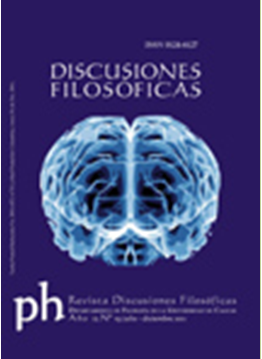Fecha Publicación: 2011-07-01
Cómo citar
Sandu, G. . (2011). Read on the liar. Discusiones Filosóficas, 12(19), 277–290. Recuperado a partir de https://revistasojs.ucaldas.edu.co/index.php/discusionesfilosoficas/article/view/627
Más formatos de cita
Autores/as
Resumen
En este artículo se analiza la solución de Read al mentiroso y se señalan algunos de sus problemas con relación a otras soluciones en la literatura.
Palabras clave
Citas
Hintikka, J. The principles of mathematics revisited. Cambridge: Cambridge University Press, 1996. Print.
Hintikka, J. & Sandu, G. “Informational independence as a semantical phenomenon”. J. Fenstad et al. (Eds.). Logic, methodology and philosophy of science VIII. Amsterdam: Elsevier Science Publishers B.V., 1989. Print.
---. “Game-theoretical semantics”. J. van Benthem & A. ter Meulen. (Eds.). Handbook of logic and language. Amsterdam: Elsevier, 1997. Print.
Hodges, W. “Compositional semantics for a language with imperfect information”. Journal of the IGPL 5. 1997: 539-563. Oxford. Print.
Hyttinen, T. & Sandu, G. “Henkin quantifiers and the definability of Truth”. Journal of Philosophical Logic 29, 2000: 507-527. Springer. Print.
Kripke, S. “Outline of a theory of truth”. Journal of Philosophy 72. 1975: 690-716. Columbia University. Print.
Martin, R. L. (Ed.). Recent essays on truth and the Liar paradox. Oxford: Oxford University Press, 1984. Print.
Martin, R. L. & Woodruff, P. W. “On representing ‘true-in-L’ in L”. Philosophia 5. 1975: 213-217. Springer. Print.
Parsons, Ch. Mathematics in philosophy. New York: Cornell University Press, 1983. Print.
Read, S. L. “The Truth Schema and the Liar”. S. Rahman, T. Tulenheimo, & E. Genot. (Eds.). Unity truth and the Liar. Amsterdam: Springer, 2008a. Print.
Sandu, G. “IF first-order Logic, Kripke, and 3-Valued logic”. Appendix to Hintikka. J. Hintikka. The principles of mathematics revisited. Cambridge: Cambridge University Press, 1996. Print.
---. “IF-logic and truth-definition”. Journal of Philosophical Logic 27. 1998: 143-164. Columbia University. Print.
Tarski, A. “The concept of truth in formalized languages”. A. Tarski and J. Corcoran. (Eds). Logic, semantics, metamathematics. Indianapolis: Hackett, 1983. Print.
Hintikka, J. & Sandu, G. “Informational independence as a semantical phenomenon”. J. Fenstad et al. (Eds.). Logic, methodology and philosophy of science VIII. Amsterdam: Elsevier Science Publishers B.V., 1989. Print.
---. “Game-theoretical semantics”. J. van Benthem & A. ter Meulen. (Eds.). Handbook of logic and language. Amsterdam: Elsevier, 1997. Print.
Hodges, W. “Compositional semantics for a language with imperfect information”. Journal of the IGPL 5. 1997: 539-563. Oxford. Print.
Hyttinen, T. & Sandu, G. “Henkin quantifiers and the definability of Truth”. Journal of Philosophical Logic 29, 2000: 507-527. Springer. Print.
Kripke, S. “Outline of a theory of truth”. Journal of Philosophy 72. 1975: 690-716. Columbia University. Print.
Martin, R. L. (Ed.). Recent essays on truth and the Liar paradox. Oxford: Oxford University Press, 1984. Print.
Martin, R. L. & Woodruff, P. W. “On representing ‘true-in-L’ in L”. Philosophia 5. 1975: 213-217. Springer. Print.
Parsons, Ch. Mathematics in philosophy. New York: Cornell University Press, 1983. Print.
Read, S. L. “The Truth Schema and the Liar”. S. Rahman, T. Tulenheimo, & E. Genot. (Eds.). Unity truth and the Liar. Amsterdam: Springer, 2008a. Print.
Sandu, G. “IF first-order Logic, Kripke, and 3-Valued logic”. Appendix to Hintikka. J. Hintikka. The principles of mathematics revisited. Cambridge: Cambridge University Press, 1996. Print.
---. “IF-logic and truth-definition”. Journal of Philosophical Logic 27. 1998: 143-164. Columbia University. Print.
Tarski, A. “The concept of truth in formalized languages”. A. Tarski and J. Corcoran. (Eds). Logic, semantics, metamathematics. Indianapolis: Hackett, 1983. Print.

 PDF
PDF
 FLIP
FLIP






















